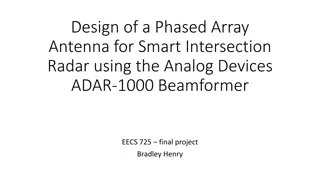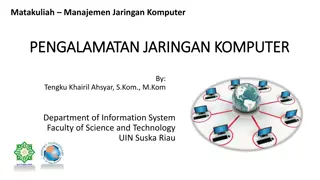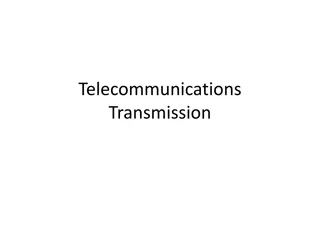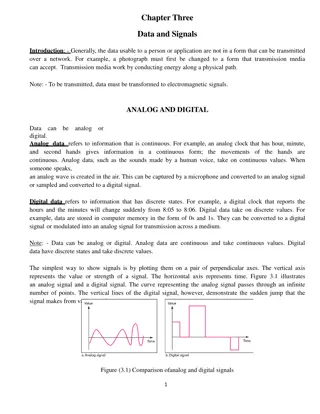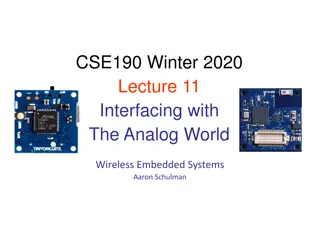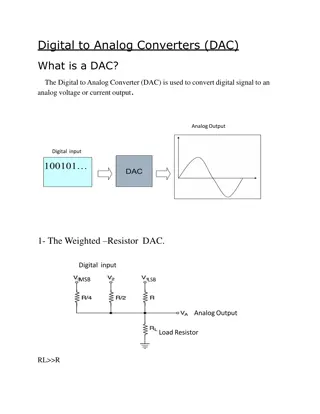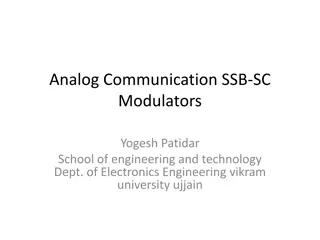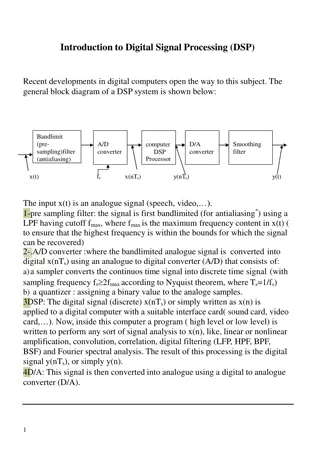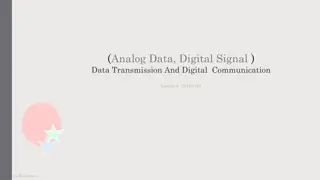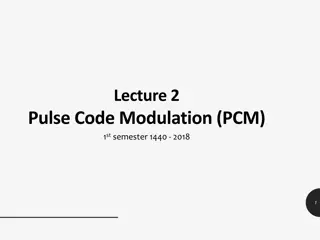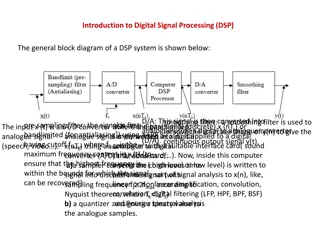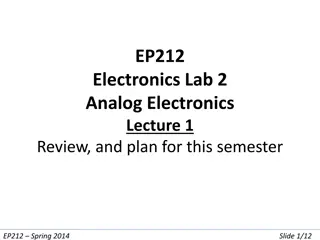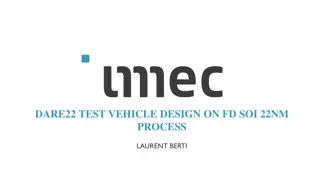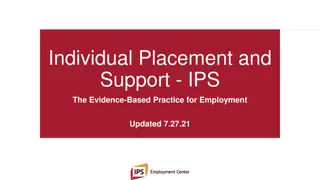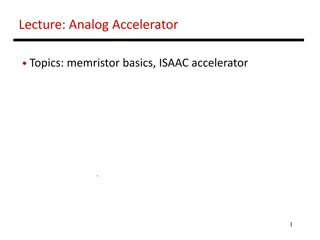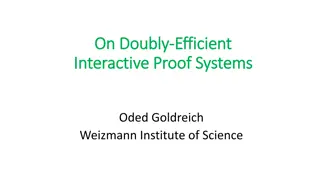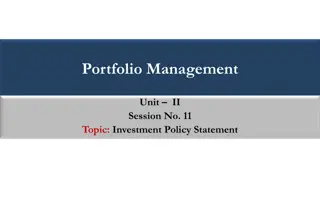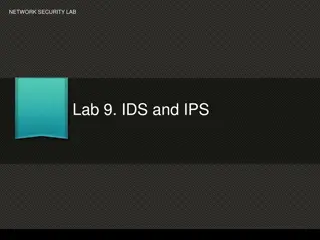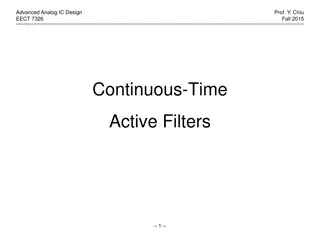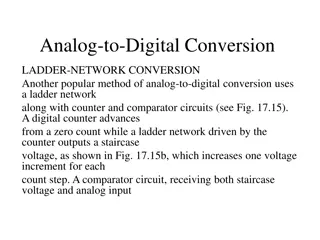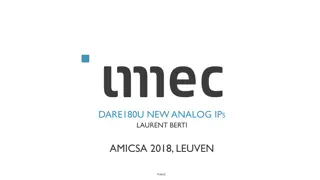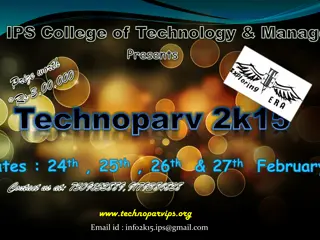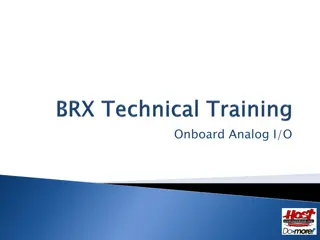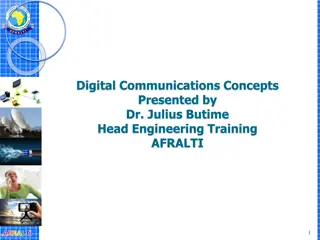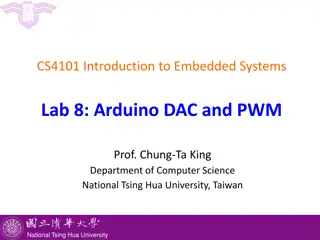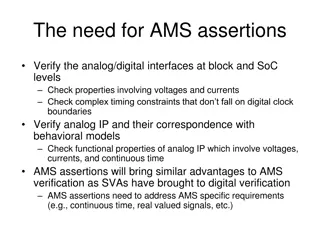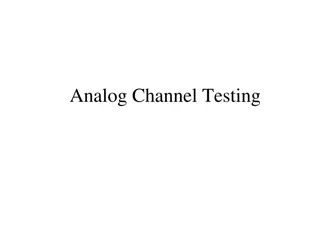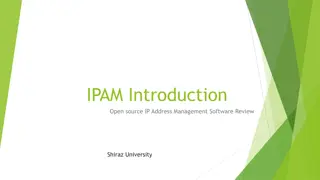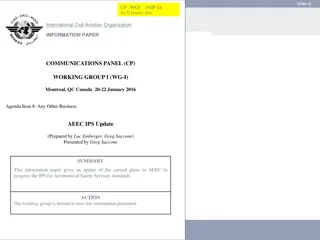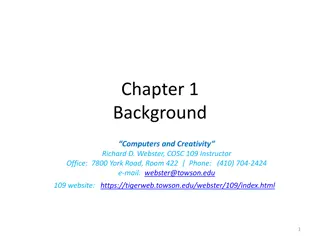Understanding IDS/IPS: Enhancing Security with SecurityGen's Advanced Solutions
In the realm of cybersecurity, Intrusion Detection Systems (IDS) and Intrusion Prevention Systems (IPS) play pivotal roles in safeguarding networks against evolving threats. SecurityGen's IDS IPS solutions are designed to monitor network traffic, detect suspicious activities, and prevent potential i
4 views • 1 slides
ANALOG AND DIGITAL ELECTRONICS 21CS33
Explore the world of analog and digital electronics through the lens of registers, counters, and flip-flops. Dive deep into the operation of these components, learn how to transfer data between registers, build and analyze shift registers, construct timing diagrams, and understand binary counters. D
0 views • 112 slides
Implementation of Bus Transfer System in Thermal Power Plant - IPS-2024 Conference Highlights
The Indian Power Stations O&M Conference (IPS-2024) showcased the successful implementation of a motor bus transfer system to address challenges in thermal power plants. Manish Kumar Shrivastava and Lav Kumar Kaushik from Chhattisgarh State Power Generation Co. Ltd presented insights on manual and p
0 views • 17 slides
Phased Array Antenna Design for Smart Intersection Radar Using Analog Devices ADAR-1000
Designing a phased array antenna system for a smart intersection radar project utilizing the Analog Devices ADAR-1000 beamformer. The system involves 4 independent phased arrays covering key directions in the intersection, with considerations for beam steering, beamwidth, and array configuration. Ke
0 views • 9 slides
Possible Analog States of the Hoyle State in Heavier Nuclei
Research conducted at the National Research Centre, Kurchatov Institute, explores possible analogs of the Hoyle state in heavier 4N nuclei, focusing on the 7.65 MeV 0+2 state in 12C (Hoyle state). The study reveals insights into the structure and characteristics of the Hoyle state, crucial for under
0 views • 12 slides
Understanding Interpolation and Pulse Shaping in Real-Time Digital Signal Processing
Discrete-to-continuous conversion, interpolation, pulse shaping techniques, and data conversion in real-time digital signal processing are discussed in this content. Topics include types of pulse shapes, sampling, continuous signal approximation, interpolation methods, and data conversion processes
4 views • 14 slides
Analog Circuits and Labs Lecture Schedule at IIT Bombay
Lecture schedule and course materials for EE204 Analog Circuits and EE230 Analog Labs delivered by Assistant Professor Sandip Mondal at IIT Bombay. The grading system, class note submission guidelines, attendance rules, and classroom discipline expectations are outlined for the course. Students are
4 views • 17 slides
Understanding Computer Network Addressing
Every computer connected to a network has a unique logical address for communication, typically identified using TCP/IP protocol. IP addressing includes Public and Private IPs, Static and Dynamic IPs, and is categorized into IPv4 and IPv6 versions. This study material elaborates on the terminologies
2 views • 28 slides
Analog Computer Simulation of Mechanical Oscillations with Damping
Explore the analog computer simulation of mechanical oscillations with and without damping in a physics-themed project. Students can visualize classical physics concepts through hands-on analog circuit design, modeling spring-mass systems and RLC circuits. The project involves constructing a breadbo
0 views • 11 slides
Understanding Telecommunications Transmission Systems
Transmission systems in telecommunications provide circuits between network nodes using channels for bidirectional communication. Channels can range from simple audio circuits to complex satellite systems. Signals can be analog or digital, each with its unique characteristics. Bandwidth is crucial f
0 views • 32 slides
Understanding Data and Signals in Networks
Data transmission involves converting information into electromagnetic signals for communication. Analog data is continuous, like a clock's hands, while digital data is discrete, like binary code in computer memory. Signals can be analog or digital, periodic or non-periodic, with characteristics lik
0 views • 17 slides
Interfacing with Analog Signals in Embedded Systems
Exploring the conversion of analog signals from the physical world into electrical signals using transducers in embedded systems. Learn about going from analog to digital representation, choosing sample rates, the Shannon-Nyquist sampling theorem, importance of anti-aliasing filters, and the necessi
0 views • 18 slides
Understanding Digital to Analog Converters (DAC) and Their Applications
Digital to Analog Converters (DAC) are essential components used to convert digital signals into analog voltage or current outputs. This article explains the working principle of DACs, provides examples of different types such as Weighted Resistor DAC, R-2R Ladder DAC, Feedback Amplifier DAC, and Si
0 views • 9 slides
Understanding SSB-SC Modulation in Analog Communication
Single Sideband Suppressed Carrier (SSB-SC) modulation is a technique in analog communication that transmits a single sideband along with the carrier signal, offering advantages such as reduced bandwidth consumption, increased signal transmission capacity, and lower noise interference. However, the
0 views • 9 slides
Overview of Digital Signal Processing (DSP) Systems and Implementations
Recent advancements in digital computers have paved the way for Digital Signal Processing (DSP). The DSP system involves bandlimiting, A/D conversion, DSP processing, D/A conversion, and smoothing filtering. This system enables the conversion of analog signals to digital, processing using digital co
1 views • 24 slides
Understanding Analog Data and Digital Signal Transmission
This lecture delves into the concepts of analog data, digital signals, and the processes involved in data transmission and digital communication. It covers topics such as Pulse Amplitude Modulation (PAM), Analog-to-Digital Conversion, and Sampling. The conversion of analog signals to digital signals
0 views • 34 slides
Understanding Pulse Code Modulation (PCM) in Analog to Digital Conversion
This content delves into the realm of Pulse Code Modulation (PCM), outlining its significance in converting analog data to digital signals. It covers the process of Analog to Digital Conversion, emphasizing the advantages of digitizing analog signals for improved quality and reduced noise. The steps
0 views • 14 slides
Understanding Digital Signal Processing (DSP) Systems: Linearity, Causality, and Stability
Digital Signal Processing (DSP) involves converting signals between digital and analog forms for processing. The general block diagram of a DSP system includes components like D/A converters, smoothing filters, analog-to-digital converters, and quantizers. DSP systems can be classified based on line
1 views • 12 slides
Analog Electronics Review and Semester Plan for EP212 Spring 2014
This presentation reviews concepts in analog electronics, focusing on operational amplifiers, feedback, signal measurement in the presence of noise, transistor amplification, differential operation constraints, and component matching in electronics labs. The semester plan includes topics such as dis
1 views • 11 slides
Understanding Analog and Digital Systems in Telecommunications
Analog systems involve altering a base carrier's frequency to encode information, while digital systems represent data as strings of 0s and 1s. Prof. Ashish Shah explains the concepts in a clear and informative manner, highlighting the differences between analog and digital technologies in telecommu
0 views • 33 slides
Overview of DARE22 Test Vehicle Design on FD SOI 22nm Process
This detailed presentation explores the test structures and components inside the TV, including combinatorial logic, sequential logic, clock gating, ring oscillators, input-output cells, analog IPs, and more. It covers various test scenarios such as irradiation testing, SET/SEU measurements, functio
1 views • 32 slides
The Impact of Individual Placement and Support (IPS) in Employment
Individual Placement and Support (IPS) is an evidence-based practice that has shown significant advantages in promoting competitive employment rates compared to traditional rehabilitation approaches. Studies have demonstrated its effectiveness across various populations, including those with mental
0 views • 35 slides
Analog Accelerator: Memristor Basics and ISAAC Accelerator
Explore the world of analog acceleration with topics covering memristor basics and the ISAAC accelerator. From understanding noisy analog phenomena to leveraging wires as ALUs, delve into crossbars for vector-matrix multiplication and the challenges of high ADC/DAC area/energy. Discover solutions li
0 views • 23 slides
Efficient Interactive Proof Systems Overview
This document discusses various aspects of efficient interactive proof systems, including doubly efficient IPs, simple doubly efficient IPs, and the Sum-Check Protocol. It explains concepts such as completeness, soundness, and strategies for verifiers and provers. The content covers examples like NP
0 views • 12 slides
Understanding Investment Policy Statements in Portfolio Management
Investment Policy Statements (IPS) are crucial documents that outline the financial objectives, risk tolerance, and constraints of an investor-adviser relationship. It guides portfolio construction, monitoring, and review, ensuring a mutually agreed basis for decision-making. Constructing an effecti
0 views • 15 slides
Understanding IDS and IPS for Network Security
Enhance the security of your network with IDS (Intrusion Detection System) and IPS (Intrusion Prevention System) by monitoring traffic, inspecting data packets, and detecting malicious activities based on known signatures. Learn about different types like HIDS and NIDS, their functions, and tools us
0 views • 7 slides
Understanding Advanced Analog IC Design and Filtering Techniques
Exploring the world of Advanced Analog IC Design through the concepts of continuous-time active filters, frequency domains, time domains, filter specifications, and examples of passive RLC filters. Delve into the intricacies of different filter types, such as low-pass, high-pass, and band-pass, to e
0 views • 60 slides
Overview of Communication Systems: Signal vs. Noise
Communication systems involve a battle between signal and noise/distortion, with information represented in analog or digital form. Analog signals include speech, music, and temperature readings, while digital signals can represent text and computer data. The history of analog and digital messages,
0 views • 17 slides
Analog-to-Digital Conversion Using Ladder Network
Another popular method of analog-to-digital conversion involves the use of a ladder network in conjunction with counter and comparator circuits. In this method, a digital counter progresses from zero while the ladder network driven by the counter generates a staircase voltage pattern, incrementing b
0 views • 6 slides
Cutting-Edge Analog IPs for High-Density SRAM and GPIO
Explore the latest advancements in analog IPs showcased at AMICSA 2018, including high-density Dual Port SRAM, General Purpose IO with local POC, Voltage Monitor, and more. Dive into the details of technology, features, and specifications for these cutting-edge designs. Discover how these innovation
0 views • 18 slides
IPS College of Technology & Management - Technoparv 2k15 - Technical Workshops and Competitions
IPS College of Technology & Management presents Technoparv 2k15, featuring a series of technical workshops and competitions from 24th to 27th February. Explore workshops like C.N.C, CAD, PLC, Mobile Control, Hacking, and engaging events such as Junk Yard, Electric Fire Path, Mini Golf, Treasure Hunt
0 views • 5 slides
Advanced Configurable Analog I/O Modules for Automation Systems
Explore a range of onboard analog I/O modules including BX10, BX18, and BX36 series, each offering high-speed discrete inputs and outputs along with analog input and output options. These modules are fully configurable with flexible voltage and current ranges. Additionally, learn about the new memor
0 views • 7 slides
Understanding Analog and Digital Communications Concepts
Exploring the differences between analogue and digital signals, this content presents a comprehensive overview. It covers the definitions of analog, the prevalence of analog signals in our surroundings, and the advantages of digital communication such as error correction, encryption, and data proces
0 views • 13 slides
Introduction to Arduino DAC and PWM in Embedded Systems Lab
Explore the practical application of Arduino's digital-to-analog converter (DAC) and pulse width modulation (PWM) techniques through projects involving RGB LED modules, analog joysticks, and stepper motors. Learn to control RGB LED colors, read analog joystick input values, and operate stepper motor
0 views • 10 slides
Advancing AMS Assertions for Analog/Digital Interface Verification
AMS assertions play a crucial role in verifying analog/digital interfaces, checking properties related to voltages, currents, and complex timing constraints. They bring advantages similar to SVAs in digital verification, addressing specific AMS requirements. Examples showcase comparisons of voltage/
0 views • 11 slides
Overview of Analog Channel Testing and Parametric Analysis
Explore the world of analog channel testing, types of analog channels, AC parametric tests, gain and level testing, and more. Understand the components involved, critical measurements like absolute voltage levels, and ways to detect circuit defects efficiently. Dive into the nuances of AC circuit pe
0 views • 60 slides
Comprehensive Review of IP Address Management Software at Shiraz University
IP Address Management (IPAM) is crucial for registering, tracking, and managing IPs efficiently. This open-source software integrates DNS and DHCP, aiding in growth strategies and transitioning to IPv6. By centralizing information, IPAM addresses challenges like IPv4 exhaustion, conflicting IPs, and
0 views • 26 slides
Update on AEEC IPS for Aeronautical Safety Services
This information paper provides an update on the progress and plans within AEEC to advance the IPS for Aeronautical Safety Services standards. It outlines the submission of the ARINC Project Initiation/Modification (APIM) to define and specify IPS, steps involved in the development plan, and upcomin
0 views • 19 slides
Understanding Digital and Analog Information in Computers
Explore the concepts of digital and analog information in computers through examples like thermometers, sound, and sight. Learn how computers process discrete digital data compared to continuous analog information, and why understanding both is essential in digital media courses. Delve into the conv
0 views • 49 slides
International Patient Summary: Today and Tomorrow - Achievements and Challenges in Healthcare Interoperability
The International Patient Summary (IPS) has made significant strides, gaining recognition and evolving from a regional standard to an international one. The transition has brought about both advantages and challenges, with a growing awareness of IPS's potential in healthcare. The move towards the 2n
0 views • 7 slides



